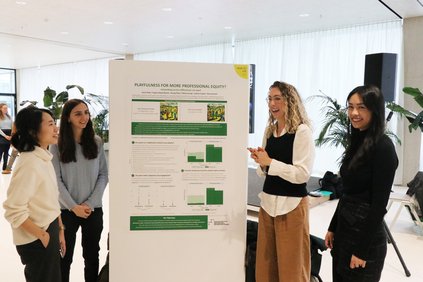Research - 22.10.2021 - 00:00
Alternative proteins and HSG Foodtechs at the spotlight of disrupting traditional food market
A new study from the University of St.Gallen investigates the potential of alternatives to animal-based proteins and their ability to address increasing consumption that comes with ever-growing population.

22 October 2021. Consumers in Germany, Austria, and Switzerland were surveyed regarding their opinions on alternative proteins. The study was conducted by the HSG FoodTech Lab at the University of St.Gallen.
With the global population anticipated to grow to 10 billion by the year 2050, food production will need to increase by 56% by 2050 to meet the needs of the population. The study sought to find the general acceptance of these alternative proteins and how much consumers were willing to pay when compared to animal-based protein. Analysis of investments in alternative protein startups was also provided in cooperation with Dealroom, a global data and analytics platform.
The study looked at several alternative proteins and separated them into five different groups: Plant-based, Algae, Insect, Fermented, and Lab-grown. The study finds that plant-based proteins are not only the most accepted protein substitute product at 75.3%, but that respondents are also willing to pay the highest price among the alternatives, which, however, is still 17% lower than that of animal-based proteins.
The study also finds that global investments in alternative-protein startups are increasing exponentially. Since 2015, there has been €7.4 billion invested in the alternative protein space by venture capitalists. Considering the total invested was only €0.6 from 2015-2017, the increase is substantial.
HSG start-up’s receiving funding in Food Tech
Dietmar Grichnik, Professor of Entrepreneurship at the University of St.Gallen, states that many startups in Europe are entering this emerging rising to take on this opportunity to which also several HSG founders count. HSG alumni Raffael Wohlgensinger co-founded the Berlin-based startup Formo, which creates a dairy-free fermented alternative protein, where they recently closed the largest round of funding for a FoodTech company in Europe at 42 million Euro. Planted, a Swiss based company, co-founded by HSG alumni Pascal Bieri, was ranked #1 out of the top 100 Swiss startups in 2021 and raised 19 million Swiss Francs to expand its plant-based meat product portfolio.
Consumers accept alternative proteins
Of the five alternative protein categories studied, 75% of study participants are accepting of plant-based proteins. This high acceptance comes as products such as Beyond Meat and Impossible Burger are increasing in popularity. The study also found that 54% of consumers could see themselves replacing their animal-based protein with alternatives. The motive for this includes concerns regarding animal welfare, the environment and their personal health. Robert Schreiber, project manager at the HSG FoodTech Lab, is convinced that besides the taste and price of alternative protein products, nutritional facts and health effects will soon gain more importance in the decision-making of consumers.
Algae-based and Fermented proteins are also highly accepted, with both seeing an over 60% acceptance in the study. As fermented products such as soy and yogurts increase in popularity, the acceptance could increase much like the plant-based alternatives.
The study found that insect-based proteins were the least accepted, with only 30.7% of participants willing to accept them.
Advancement of lab-grown meat
The current market for alternative proteins as a whole is roughly 15 billion USD. With an expected annual growth rate of 8.67%, the market is projected to be 22.8 billion USD by the year 2025. When broken down into groups, the highest projected growth rates are seen by insect-proteins and lab-grown proteins. Lab-grown meat is projected to see an annual growth rate of 15%, but the market size in 2020 was the smallest at just 0.22 billion USD.
Alternative proteins present an exciting opportunity to provide sustainable, healthy options for consumers and producers alike. Consumers are becoming increasingly accepting and aware of the different options. And with rising investments in numerous alternative protein startups throughout the world, it’s very possible for the animal-based protein market to be disrupted in the coming years.
The white paper of the study can be found as a PDF attachment.
Contact point for questions:
Prof. Dr. Dietmar Grichnik, Professor for Entrepreneurship and Technology Management
Institute of Technology Management (ITEM-HSG)
dietmar.grichnik(at)unisg.ch, www.item.unisg.ch
Robert Schreiber, Project Manager at the HSG FoodTech Lab
robert.schreiber(at)unisg.ch, www.foodtechlab.ch
Image: Unsplash / Dose Juice
https://www.foodtechlab.ch/
More articles from the same category
This could also be of interest to you
Discover our special topics















